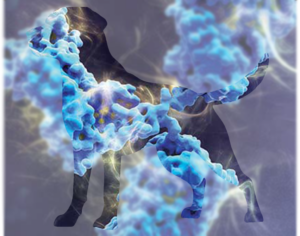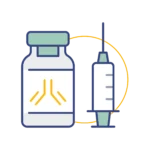
Immunotherapy in veterinary medicine is a rapidly evolving field that leverages the immune system to fight diseases. These therapies are particularly effective in treating various cancers, including lymphomas, mast cell tumors, melanomas, and osteosarcomas. Beyond cancer, immunotherapies are also being explored for their potential in managing chronic inflammatory diseases, such as autoimmune disorders where the immune system mistakenly attacks the body’s own tissues. While traditionally, veterinary treatments have focused on surgery, chemotherapy, and radiation, the advent of immunotherapy offers a more targeted approach, particularly for conditions like cancer.
This targeted approach not only minimizes collateral damage to healthy tissues but also offers the potential for longer-lasting protection by training the immune system to recognize and fight off recurrence of the disease. The interest in immunotherapies has grown in tandem with advancements in human oncology, leading to a crossover of technologies and methodologies into veterinary applications.
How Does Immunotherapy Work?
Immunotherapy works by stimulating the animal’s immune system to attack cancer cells or by providing components such as synthetic immune system proteins. There are several types of immunotherapies currently being explored and used in veterinary medicine, including:

Monoclonal antibody therapy involves the use of laboratory-engineered antibodies that are designed to specifically target antigens on cancer cells. By binding to these antigens, monoclonal antibodies flag the cancer cells for destruction by the immune system, providing a targeted and effective treatment option with minimal impact on healthy cells.

Vaccines represent another cutting-edge approach, designed not for prevention, but as a therapeutic strategy to treat existing cancers. These vaccines work by stimulating the animal’s immune system to recognized and attack cancer cells that have already developed, bolstering the animal’s natural defenses against cancers.

Checkpoint inhibitors work by blocking the immune checkpoints, which are regulatory pathways in the immune system that cancer cells often exploit to avoid being attacked. By inhibiting these checkpoints, these drugs allow the immune system to mount a more robust and effective response, overcoming one of the key mechanisms by which cancers evade immune detection.

Adoptive cell therapy is a highly specialized approach where immune cells are extracted from the animal, genetically modified or enhanced in the lab, and then reintroduced to target and destroy cancer cells. This method, although still largely experimental in veterinary medicine, offers the potential for highly personalized treatment that is tailored to the specific immunological profile of an individual animal.
Real-World Applications of Immunotherapy in Veterinary Medicine
The implementation of immunotherapy in veterinary medicine has its roots in parallel advancements in human medicine, with early examples appearing in the late 1990s and early 2000s. One of the pioneering instances was the development of the canine melanoma vaccine, which was among the first FDA-approved therapeutic cancer vaccines for animals (1). This vaccine was developed by researchers at the Memorial Sloan Kettering Cancer Center and licensed by Merial (now part of Boehringer Ingelheim) around 2007. It targets a protein called tyrosinase, which is overexpressed in melanoma cells. The vaccine was initially used in dogs with advanced stages of melanoma, and it demonstrated significant potential in extending survival times and improving the quality of life for treated dogs. This marked a major milestone in veterinary medicine, because it was the first time a vaccine specifically designed to treat an existing cancer in animals had been made available (1).
Another significant advance was the introduction of monoclonal antibody therapies for treating canine lymphoma. In 2012, the first monoclonal antibody for veterinary use, called TANOVEA-CA1, was developed and approved for treating lymphoma in dogs. This therapy, created by VetDC, Inc., works by specifically targeting and destroying cancerous B-cells while sparing healthy cells. It was a groundbreaking development, as lymphoma is one of the most common cancers in dogs, and traditional treatments like chemotherapy often come with significant side effects. The introduction of TANOVEA provided a new, less invasive treatment option with promising outcomes (2).
Challenges for Implementing Immunotherapy in Veterinary Medicine
Despite its revolutionary potential, the implementation of immunotherapy in veterinary medicine faces several significant challenges. One of the primary hurdles is the high cost associated with developing and administering these therapies. Immunotherapies, such as monoclonal antibodies and cancer vaccines, often require sophisticated laboratory techniques and are produced in small batches, leading to high production costs. This can make these treatments prohibitively expensive for many pet owners.
Additional challenges lie in the species-specific differences between humans and animals. Much of the initial research and development in immunotherapy has been focused on human medicine, and while some of these advancements can be adapted for veterinary use, the physiological differences between species mean that not all therapies are directly translatable. This necessitates extensive research and testing to ensure safety and efficacy in animals, which can delay the availability of new treatments.
Check out our suite of Canine Bioassays for ADCC and PD-1. These bioassays developed specifically for canines bring ease, consistency and confidence to your canine cancer therapy research and development.
Our academic access program helps address some of this research cost by enabling researchers exploring novel treatments to benefit not only from reduced costs and access to the latest technology, but also gain the R&D support needed to drive their research forward through fostered collaboration.
Promega cutting-edge bioassays, reagents, and diagnostic tools enable scientists working to research and develop immunotherapies tailored for animals. Promega technologies support the identification of biomarkers, assessment of immune responses, and evaluation of therapeutic efficacy, all of which are essential for overcoming the scientific and clinical challenges associated with immunotherapies.
Literature Cited
- Cornell University College of Veterinary Medicine. Immunotherapy Treatment. [Internet: https://www.vet.cornell.edu/departments-centers-and-institutes/riney-canine-health-center/canine-health-information/immunotherapy-treatment Accessed: 9 September 2024.]
- FDA News Release. 15 July 2021. FDA Grants First Full Approval for Treatment of Lymphoma in Dogs. [Internet: https://www.fda.gov/news-events/press-announcements/fda-grants-first-full-approval-treatment-lymphoma-dogs Accessed: 9 September 2024.]

